- Home
- Adam Croft
In the Name of the Father
In the Name of the Father Read online
In The Name Of The Father
Adam Croft
Contents
Get more of my books FREE!
Books in this Series
Chapter 1
Chapter 2
Chapter 3
Chapter 4
Chapter 5
Chapter 6
Chapter 7
Chapter 8
Chapter 9
Chapter 10
Chapter 11
Chapter 12
Chapter 13
Chapter 14
Chapter 15
Chapter 16
Chapter 17
Chapter 18
Chapter 19
Chapter 20
Chapter 21
Chapter 22
Chapter 23
Chapter 24
Chapter 25
Chapter 26
Chapter 27
Chapter 28
Chapter 29
Chapter 30
Chapter 31
Chapter 32
Chapter 33
Chapter 34
Chapter 35
Chapter 36
Chapter 37
Chapter 38
Chapter 39
Chapter 40
Chapter 41
Chapter 42
Chapter 43
Chapter 44
Chapter 45
Chapter 46
Chapter 47
Chapter 48
Chapter 49
Chapter 50
Chapter 51
Chapter 52
Chapter 53
Chapter 54
Chapter 55
Chapter 56
Chapter 57
Get more of my books FREE!
Get more of my books FREE!
To say thank you for buying this book, I’d like to invite you to my exclusive VIP Club, and give you some of my books and short stories for FREE.
To join the club, head to adamcroft.net/vip-club and two free books will be sent to you straight away! And the best thing is it won’t cost you a penny — ever.
* * *
Click here to join the VIP Club
Adam Croft
* * *
For more information, visit my website: adamcroft.net
Books in this Series
Books in the Knight and Culverhouse series so far:
1. Too Close for Comfort
2. Guilty as Sin
3. Jack Be Nimble
4. Rough Justice
5. In Too Deep
6. In the Name of the Father
* * *
To find out more about this series and others, please head to adamcroft.net/list.
1
Isabella Martin stood rooted to the spot as Father Joseph Kümmel’s eyes bore into hers. For a while, he said no words. He didn’t need to.
She’d been considering her escape from Hilltop Farm for some time. Recently she’d made the grave mistake of voicing her doubts to another member of the community. She’d thought she could trust her, considered her a friend. But now she was standing in front of the man who’d started this, who’d brought them all here, and expected her to repent for her sins.
‘Isabella, do you ever plan your own death?’ the man said, his deep Germanic tones rumbling as he spoke.
The farmhouse smelt damp and musty, as it always did at this time of year. The room felt oppressive, little light sneaking in through the small, high windows. Although she stood alone, facing the seated Father Joseph across his desk, she felt a thousand eyes upon her. The building was known as the chapel, although Isabella had long since rejected it as such in her mind. To her, it was now just another farmhouse. In any case, it felt more like a crypt than a chapel.
She swallowed, her mouth dry, struggling for something to say.
‘No... No, I don’t.’
Father Joseph smiled. It wasn’t a happy smile, but the knowing twinkle of a parent whose child has just told them they’re going to be an astronaut when they grow up.
‘Do you not find that odd? After all, let’s face it: you’re going to die. We all are. Do you not think it important to plan ahead and take control over that event?’
Isabella clenched her teeth. Control was something she’d lacked for a long time, something she’d gradually come to realise she was missing. And here was the man she held responsible, urging her to take control, telling her it was within her power. Had she been wrong all along? Had Father Joseph been guiding her nobly, the only resistance coming from within herself?
‘It... It’s not something I’ve ever thought about,’ she said, desperate to gauge Father Joseph’s mood and thoughts from the look in his eyes.
‘Do you not think it is time to think about it?’ he said, cocking his head slightly to one side. He stayed silent, looking at her. Isabella could tell he was going to say no more and felt compelled to speak next.
‘I’m not sure what you mean.’
Father Joseph smiled again.
‘Child, you have a strong character. A strength of will. It is that strength of will that compelled you to express your doubts, to consider leaving the community. Do you see now that you were misguided in that sentiment?’
Isabella nodded, unable to express any words. She tried to work out whether he was angry or empathetic, but couldn’t.
‘You are not to blame, Isabella,’ he said, as if reading her mind and wanting to answer her question. ‘It is perfectly natural for someone as strong willed as you to doubt. But you are also well aware of what dark forces have planted that doubt, are you not?’
She nodded again. The word wasn’t one that was ever spoken within the community. No matter how removed Isabella had felt from this place recently, she still felt a cold shiver down her spine whenever she even considered it.
‘Which is why it is time for you to take control, Isabella. You are in charge of your own destiny. You make every decision in your life through free will. It is your free will that brought you here, that put you under the wing of God’s love. You are a person in control. Do you want those dark forces to consume you from within, to take that control away from you?’
Isabella shook her head, slowly at first.
‘No... No.’
‘Then you must take the ultimate control,’ he said, sliding a coffee mug across the desk towards her with the tips of his fingers. ‘You must make the decision. Take the step that most people will never have the strength of character to take.’
Isabella looked down at the coffee mug. It looked like any cup of coffee, except there was no steam. She looked back up at Father Joseph, seeing that his eyes had never left hers.
‘I... I can’t,’ she said. ‘I don’t want to.’
‘It is not you speaking, Isabella. You want to take control. You want to make this choice.’
‘No... No. I don’t. I can’t,’ she said, her voice faltering.
Father Joseph clenched his jaw. Isabella heard two footsteps to her side. She turned her head and saw the faint but familiar frame of Nelson, one of Father Joseph’s closest confidants. His eyes were milky and tense, his black skin still disguised in the shadows. She caught a glint of light that flashed below and just to the left of Nelson. It was only for a moment, but enough to make her realise that he was holding a gun in his right hand.
Isabella looked back at the coffee mug.
She recalled the stories one of the other members of the community had told her. Legend was that those who transgress are sometimes made to prove their devotion to the community and to Father Joseph. Long before Isabella had come to the farm, a male member of the community was apparently handed a gun by Father Joseph and told to kill one of the two of them. The man had lifted the gun to his own temple
and pulled the trigger, only to find the gun hadn’t been loaded. From that point on, having proven his devotion, the man had lived the life of a king. Isabella didn’t know his name, or what had ultimately happened to him, nor did she know anyone who’d ever met him. But the story remained powerful, indelible on her consciousness.
Was this what was happening here? Was this simply a harmless mug of cold coffee, intended to be a make-or-break moment for her? Either way, she now knew what the alternative was. She glanced back at Nelson, herself almost able to feel the cold steel of the gun.
She extended her arm, her elbow popping as she did so, and took hold of the coffee cup. Slowly, she lifted it to her lips and drank.
It was definitely coffee, she knew that much. Cold coffee. Knowing the taste would be unpleasant, and only wanting to experience it once, she slugged back the mug’s contents in one.
Within seconds of putting the mug down, she could feel the butterflies in her chest and throat. Her neck tightened as she began to gasp for breath. Time seemed to slow, her legs buckling from under her as her stomach began to heave, her body shivering as it began to convulse. Without warning, she vomited, the stream of liquid splattering across the concrete floor of the farmhouse, masking the sound of her losing control of her bowel and bladder.
Gradually, everything faded, became black.
2
Jack Culverhouse sat in the armchair in his living room, as he had all night, looking at the clock. It was almost nine-thirty in the morning and he ought to be at work, but work could wait.
He’d just handed a big case over to the Crown Prosecution Service. It was the attempted murder of an investigative journalist who’d been about to expose a local political scandal and cover-up. He figured he was due a break. Besides which, he’d just seen his thirteen-year-old daughter for the first time in almost nine years, having tried to track her down all over the world before finding out she’d been living in the same county the whole time.
His wife, Helen, had disappeared with Emily in the dead of night all those years ago and had only recently come back on the scene. He had no idea why — she’d become a completely different person and now seemed hell bent on causing arguments and frustration. She’d led him a merry dance, right across Europe, trying to track her down and see his daughter again. But, through it all, Emily had been living with Helen’s parents barely a few miles up the road. Helen’d had almost as little contact with her as Jack had.
When Emily had got in touch with him yesterday evening, it had been the last thing he’d expected. He’d been to see her that week at the skatepark near where she’d been living, hoping to catch a glimpse of her but not intending on speaking to her. That had all changed as soon as he saw her.
The welcome he got had been less than enthusiastic. Although Emily had recognised him immediately, she’d made it crystal clear that she had no desire to see him or spend any time with him.
But that seemed to have been a momentary flash in the pan.
He’d called her back as soon as he received her text just before eight o’clock the previous evening. She sounded cut up, devastated. It was clear to Jack that the shock of seeing him again had made her react in the way she had, and he forgave her. Of course he did; she was his daughter.
She didn’t say much when she got to his place; she’d just wanted to go straight to bed. She seemed exhausted — more worn down than worn out — and Jack had more than enough good sense not to force the issue. As much as he wanted to see Emily as his little girl in pigtails, those days were over. And he hadn’t seen nearly half as many of them as he would’ve liked. Now, she was a teenager. She had her own ideas, her own direction. Her own life.
He’d opened the door to the spare room, just a few inches, around half an hour after she’d closed the door and gone to bed. It didn’t seem right having her sleep in her old bedroom. Besides which, he’d long since moved everything of hers into the loft. All that was in there now were boxes and stored furniture.
The first thing that struck him was how different she looked sleeping to how she did when she was awake. He would’ve said she looked just fine when she was awake, but only seeing the peaceful, serene look on her face as she slept had made him realise the pain and anguish she must be feeling in her waking hours. He wanted more than anything to walk over and cradle her, feel like the protective father. But he knew he couldn’t. This had to be done one step at a time.
The miniature clock on the mantelpiece gave one small, tinny gong to signal it was exactly half past nine. He’d been awake for well over twenty-four hours — almost twenty-eight — but he didn’t feel tired.
He looked at the glass of whisky on the table next to him, still untouched from last night, and registered the sound of movement upstairs. A few seconds later, he heard the noise of Emily’s footsteps on the stairs, getting louder as she made her way down and opened the door to the living room.
Jack looked at her.
‘Morning.’
Emily lifted her chin momentarily, as if to acknowledge him without saying a word. Her dark hair was tied back, part of her fringe hanging lank over one cheekbone, a black hoody coming down almost to her knees.
‘Bit early for a teenager to be up, isn’t it? I was expecting peace and quiet until well after lunch.’
Emily seemed unsure how to respond at first, but eventually gave a half-forced smile.
‘What’s for breakfast?’ she said, pushing the stray bit of fringe back over her ear, the ends of her fingers barely visible past the end of the hoody’s long black sleeves.
Her eyes fell on Jack’s whisky glass.
His followed.
‘That’s from last night,’ he said. ‘I poured it before you texted me. I just haven’t thrown it away yet.’
Emily nodded. Jack couldn’t tell whether she believed him or not. In any case, what did it matter? Was he not allowed to drink whisky in his own home? Or had Helen and her parents fed Emily stories about Jack being some sort of stereotypical drink-driven detective? He didn’t know, and he wasn’t sure he wanted to.
‘What would you like?’ he said. ‘I can rustle up a mean scrambled eggs on toast.’
‘Sounds good,’ she said, without any hint of tone whatsoever.
* * *
The eggy mixture cracked and sizzled as he moved it around the pan with a wooden spatula. He was aware of Emily sitting at his kitchen table behind him, hands wrapped around a mug of milky coffee.
‘I hope the milk’s still alright. I have mine black, so I don’t tend to use it much. Mind you, I’ve put a splash in the eggs, too, so at least we’ll both get it. Good job I’ve got two bathrooms.’
He turned slightly to look at Emily. She didn’t seem to register him speaking at all. Instead, she just looked down into her mug of coffee.
The eggs cooked, Jack spooned them onto two slices of toast and slid one over to her.
He took a mouthful and then asked the question he’d wanted to ask her ever since last night.
‘So. What brings you here?’
Emily shrugged, not taking her eyes from the mug. Jack could see her black nail polish was slightly chipped, the nails bitten back as far as they’d go.
‘Problems with Nan and Grandad?’ he asked.
She shuffled in her chair and let out what sounded like half a sigh.
He took another mouthful of scrambled egg.
‘How often do you see your mum?’
Another shrug.
‘I must admit, she didn’t tell me much about you,’ he said. ‘I didn’t even see her until quite recently, when she knocked at my door. I don’t know where she’d been.’ He took a sip of coffee. ‘Do you remember the house at all?’
Emily shook her head. He felt relieved that he wouldn’t get any backlash for moving all her stuff into the loft.
‘Not really,’ she said. ‘Bits of it. I remember the living room wallpaper. You haven’t decorated.’
Jack smiled. ‘Does that surprise you?’
‘I honestly had no idea where you were. All I knew is your mum had left and taken you with her. I heard something on the grapevine later on about Spain. I tried to find you. I even booked a flight out there, but I couldn’t find you,’ he said, not mentioning the fact that he’d not actually got on the plane. ‘Emily, look, I don’t know what your mother and your grandparents have said. I know it won’t have been nice stuff. I know how things work in the heat of the moment. But I... I just wanted to say thank you. For coming here. For coming to see for yourself that I’m not such a bad bloke after all.’
Emily put her knife and fork on her plate and pushed her chair backwards.
‘Can I go now?’
Jack looked down at her breakfast. ‘You haven’t finished yet. There’s still half of it on your plate.’
‘I’ve got places to be,’ she said, getting up and walking into the hall. Jack stood and watched her pick up her rucksack, sling it over her shoulder and open the front door.
‘Will I see you later?’
‘I’ll text you,’ she said, closing the door behind her.
3
James Aston looked again at the image on his mobile phone. He’d transferred them from his computer before leaving the house, just in case he needed them. He blinked twice, squinting to make sure he was seeing what he thought he was seeing. The images were never of particularly good quality, but that was the way they had to be. Getting any closer would raise suspicions. But as fuzzy and indistinct as the wording itself was, the message was clear.
He’d been waiting to see something like this for a long time: something hard, concrete. Something that could finally blow the lid on everything. Something that could bring his family back to him.
Again, he looked at the photograph. He needed to make sure. He needed to be certain. Sure, some of the letters were difficult to tell apart — was that an A or an E? — but that was all more or less irrelevant. It was obvious what it said. Would anyone else see the same message he was seeing? He didn’t know, but he had to take the risk. It was now or never.

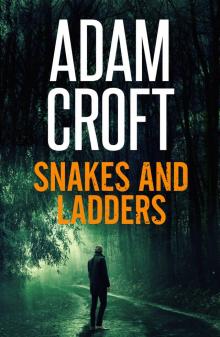 Snakes and Ladders
Snakes and Ladders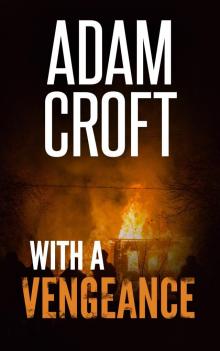 With A Vengeance
With A Vengeance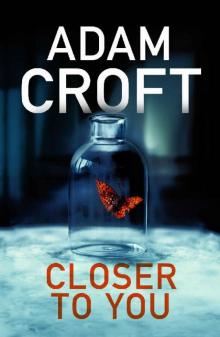 Closer to You
Closer to You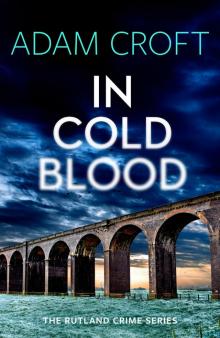 In Cold Blood
In Cold Blood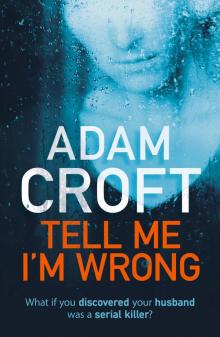 Tell Me I'm Wrong
Tell Me I'm Wrong![[Knight and Culverhouse 09] - In Plain Sight Read online](http://i1.bookreadfree.com/i/03/16/knight_and_culverhouse_09_-_in_plain_sight_preview.jpg) [Knight and Culverhouse 09] - In Plain Sight
[Knight and Culverhouse 09] - In Plain Sight Dead & Buried
Dead & Buried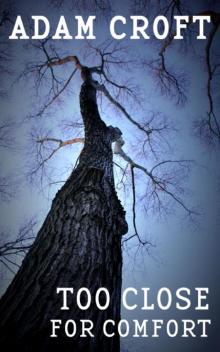 Too Close For Comfort
Too Close For Comfort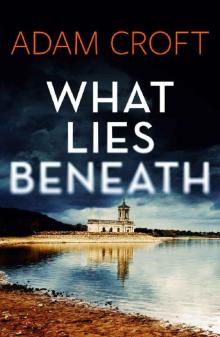 What Lies Beneath (Rutland crime series Book 1)
What Lies Beneath (Rutland crime series Book 1)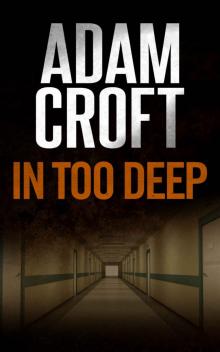 In Too Deep (Knight & Culverhouse Book 5)
In Too Deep (Knight & Culverhouse Book 5) Gone
Gone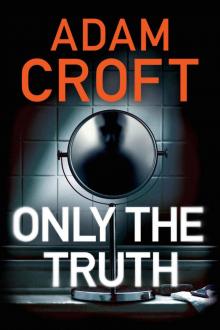 Only the Truth
Only the Truth Kempston Hardwick Mysteries — Box Set, Books 1-3
Kempston Hardwick Mysteries — Box Set, Books 1-3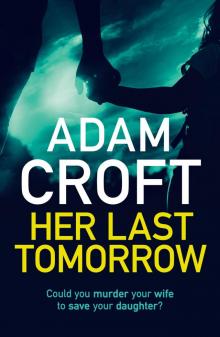 Her Last Tomorrow
Her Last Tomorrow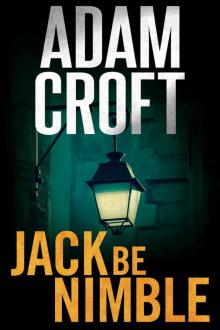 Jack Be Nimble (Knight & Culverhouse Book 3)
Jack Be Nimble (Knight & Culverhouse Book 3)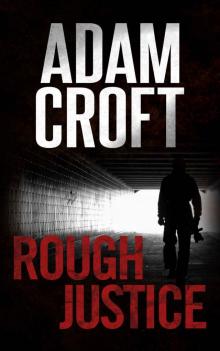 Rough Justice (Knight & Culverhouse Book 4)
Rough Justice (Knight & Culverhouse Book 4)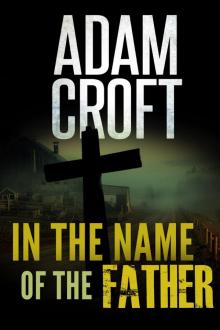 In the Name of the Father
In the Name of the Father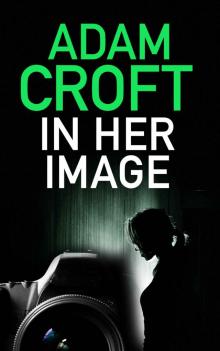 In Her Image
In Her Image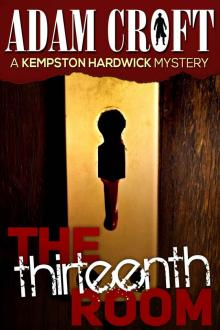 The Thirteenth Room (Kempston Hardwick Mysteries Book 4)
The Thirteenth Room (Kempston Hardwick Mysteries Book 4)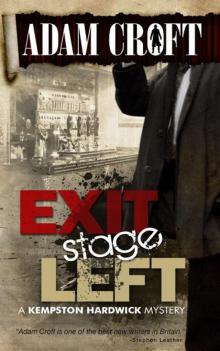 Exit Stage Left (Kempston Hardwick Mysteries Book 1)
Exit Stage Left (Kempston Hardwick Mysteries Book 1)